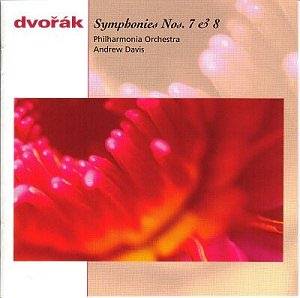These two symphonies, surely Dvorák's
greatest (despite the popularity of the New World, No. 9),
have English connections. The commission to compose the Symphony No. 7
came from London, following the rapturous response to the performance
there of his Sixth Symphony the previous March. Elected an Honorary Member
of the Philharmonic Society of London (which became the Royal Philharmonic
Society in 1912), he was at the same time asked to respond with a new
symphony. And the Symphony No. 8 was first published by Novello of London,
largely because the composer was for a short time embroiled in a dispute
with Simrock, his usual publisher.
In these auspicious circumstances Dvořák
intended that Symphony No.7 in D minor should be 'capable of shaking
the world' Music of tragic intensity, its four movements are generated
by inspiration of the highest order, whose nature stemmed directly from
the Dvořák's intention to create his most powerful score
to date. Yet there is nothing inflated about the symphony, which is
scored for the 'standard' orchestra of the day: pairs of woodwind, four
horns, two trumpets, three trombones, timpani and strings. In fact the
relatively modest resources intensify the delivery of the musical material
and the symphonic argument, with darkly coloured orchestration which
is at once imaginative and resourceful.
All these things are abundantly clear in the performance
the Philharmonia Orchestra and Andrew Davis recorded in July 1979. They
are supported by an admirably rich and clear recording. Like any great
symphony this music is greater than any one performance of it, and while
other conductors (István Kertesz and Libor Pesek, for example)
may offer more Czech inflections to the rhythms of the third movement,
Davis has the music's measure well enough. Add the quality of the orchestral
playing, with the Philharmonia at the top of their form, and this is
a most competitive issue.
The Symphony No. 8 can also be recommended with confidence.
Despite the English connections, this is one of the most thoroughly
Bohemian works the composer ever created. The music has a rhapsodic
freedom at the same time as a very natural sense of continuity. Moreover
it is much less concerned the taut construction of the classical symphonic
tradition than any of its predecessors. Andrew Davis chooses tempi which
allow both forward momentum and an appreciation of the music's innate
lyrical qualities. Again one can find more idiomatically Czech performances,
perhaps, but this remains hugely enjoyable. There is room for drama
too, as at the climax of the slow movement, which achieves a striking
intensity of expression. Likewise the variation form finale has a sweep
of momentum which is at once cogent and compelling.
While admitting that there are other fine recordings
of these two great symphonies, these performances by Davis and the Philharmonia
are particularly enjoyable.
Terry Barfoot


